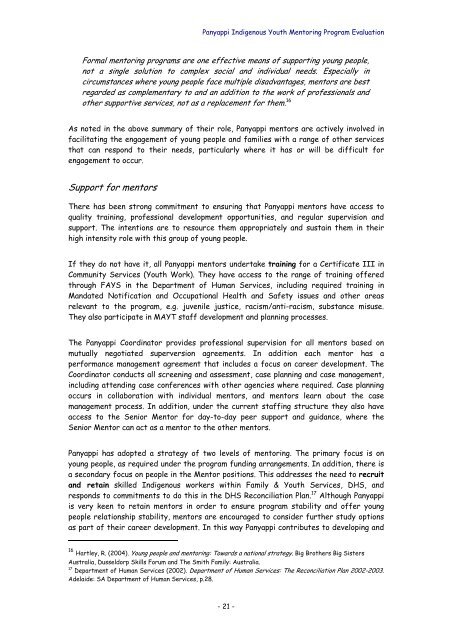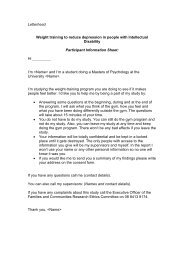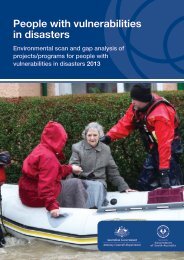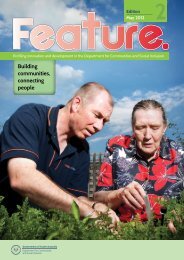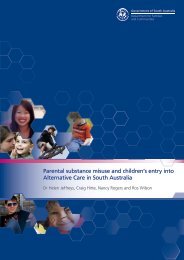Panyappi Indigenous Youth Mentoring Program Evaluation
Panyappi Indigenous Youth Mentoring Program Evaluation
Panyappi Indigenous Youth Mentoring Program Evaluation
You also want an ePaper? Increase the reach of your titles
YUMPU automatically turns print PDFs into web optimized ePapers that Google loves.
<strong>Panyappi</strong> <strong>Indigenous</strong> <strong>Youth</strong> <strong>Mentoring</strong> <strong>Program</strong> <strong>Evaluation</strong><br />
Formal mentoring programs are one effective means of supporting young people,<br />
not a single solution to complex social and individual needs. Especially in<br />
circumstances where young people face multiple disadvantages, mentors are best<br />
regarded as complementary to and an addition to the work of professionals and<br />
other supportive services, not as a replacement for them. 16<br />
As noted in the above summary of their role, <strong>Panyappi</strong> mentors are actively involved in<br />
facilitating the engagement of young people and families with a range of other services<br />
that can respond to their needs, particularly where it has or will be difficult for<br />
engagement to occur.<br />
Support for mentors<br />
There has been strong commitment to ensuring that <strong>Panyappi</strong> mentors have access to<br />
quality training, professional development opportunities, and regular supervision and<br />
support. The intentions are to resource them appropriately and sustain them in their<br />
high intensity role with this group of young people.<br />
If they do not have it, all <strong>Panyappi</strong> mentors undertake training for a Certificate III in<br />
Community Services (<strong>Youth</strong> Work). They have access to the range of training offered<br />
through FAYS in the Department of Human Services, including required training in<br />
Mandated Notification and Occupational Health and Safety issues and other areas<br />
relevant to the program, e.g. juvenile justice, racism/anti-racism, substance misuse.<br />
They also participate in MAYT staff development and planning processes.<br />
The <strong>Panyappi</strong> Coordinator provides professional supervision for all mentors based on<br />
mutually negotiated superversion agreements. In addition each mentor has a<br />
performance management agreement that includes a focus on career development. The<br />
Coordinator conducts all screening and assessment, case planning and case management,<br />
including attending case conferences with other agencies where required. Case planning<br />
occurs in collaboration with individual mentors, and mentors learn about the case<br />
management process. In addition, under the current staffing structure they also have<br />
access to the Senior Mentor for day-to-day peer support and guidance, where the<br />
Senior Mentor can act as a mentor to the other mentors.<br />
<strong>Panyappi</strong> has adopted a strategy of two levels of mentoring. The primary focus is on<br />
young people, as required under the program funding arrangements. In addition, there is<br />
a secondary focus on people in the Mentor positions. This addresses the need to recruit<br />
and retain skilled <strong>Indigenous</strong> workers within Family & <strong>Youth</strong> Services, DHS, and<br />
responds to commitments to do this in the DHS Reconciliation Plan. 17 Although <strong>Panyappi</strong><br />
is very keen to retain mentors in order to ensure program stability and offer young<br />
people relationship stability, mentors are encouraged to consider further study options<br />
as part of their career development. In this way <strong>Panyappi</strong> contributes to developing and<br />
16 Hartley, R. (2004). Young people and mentoring: Towards a national strategy. Big Brothers Big Sisters<br />
Australia, Dusseldorp Skills Forum and The Smith Family: Australia.<br />
17<br />
Department of Human Services (2002). Department of Human Services: The Reconciliation Plan 2002-2003.<br />
Adelaide: SA Department of Human Services, p.28.<br />
- 21 -


